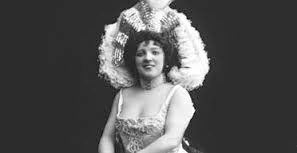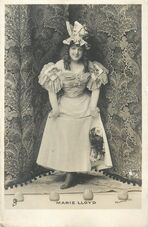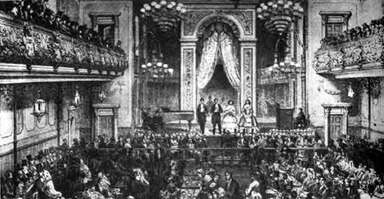"Among the small number of music-hall performers, whose names are familiar to what is called the lower class, Marie Lloyd had far the strongest hold on popular affection.”
My grandmother, like Lloyd, liked to sing and knew nearly all her songs off by heart, I have such fond memories of her singing in the kitchen, in the bathroom, and even hanging out the washing. My brother and I used to get into bed with gran every morning and how I loved it when she sang all the old music hall songs she learned as a child. Songs such as My Old Man, The Boy that I love is up in the Gallery, Pop Goes the Weasel,’ and One of the Ruins the Cromwell Knocked About a Bit.
There also was a song which I think was called The Grand Hotel, which was my favourite, yet I only remember a few lines from the end of the song.
"there’s a cow with three legs that doesn’t lay eggs and the chickens don’t lay any milk. They’ve a graveyard of their own, where some of the past lodgers dwell. It must not be forgotten, the grubs simply rotten, but that’s why we stay at the Grand Hotel.
If anyone knows the rest of it or anything about it, please do let me know.
My grandmother's early life in the East End was much the same as Marie Lloyd's, maybe that’s why the songs appealed to her, it may also be the fact that her mother, my great-grandmother, sang at the Crystal Palace as a young girl and she always maintained that we were related in some way to Lloyd. This connection I have yet to find. Like Lloyd, my beloved grandmother was born in the East End of London, the family lived in Canning Town and her father worked as a boiler maker on the docks. My grandmother's family can be found living in the blue highlighted area of Charles Booth's 1898 poverty map of London which represented the group of people described as “Very poor, casual. Chronic want.” Today my grandmother's family would probably fit into what is stated to be the Precariat Class “The most deprived class of all with low levels of economic, cultural and social capital.” The birth certificates of all the children show that they were never in the same house for more than two years, this was probably due to rent arrears and my great-grandfather sometimes being out of work.
Gran was one of sixteen children, and only five of her siblings lived into adulthood. Her mother was a seamstress and gran, from an early age, went from door to door selling the items of clothing her mother had made, I believe that Marie Lloyd's song
My Old Man was too close to home for my gran to find it amusing.
My old man said: "Foller the van,
And don't dilly-dally on the way".
Off went the van wiv me 'ome packed in it.
I walked be'ind wiv me old cock linnet.
But I dillied and dallied, Dallied and dillied;
Lost me way and don't know where to roam.
http://youtu.be/lfW3TxQhy20
Marie Lloyd was an opinionated, strong-willed girl who hated authority and it seems that it was only her mother who was able to manage her temperament. Lloyd's talent soon enabled her to take to the stage where at the age of fifteen she was still known as Matilda Wood, by the June of that same year she had changed it to Marie Lloyd. It was as Marie Lloyd, appearing at the Falstaff Music Hall, that she had her first taste of fame singing The Boy I Love is up in the Gallery, and by 1886 she was singing it in the West End.
Today, Marie Lloyd's songs appear to be harmless but were classed as racy in the 1890s. These songs, along with her use of innuendo and double entendre plus the addition of her famous wink created a relationship with her audience, she was really saying I know that you know what I really mean. “She'd never had her ticket punched before” one of her phrases from the song 'Oh, Mr Porter' is a good example of this. On the surface, it is a story of a young innocent girl travelling alone to the big city, but the winks and gesturing gave it another complete meaning. Another example is ‘A Little of What You Fancy doe’s you good’
If you fancy it, that's understood
And suppose it makes you fat?
I don't worry over that
A little of what you fancy does you good.
"They don't pay their sixpences and shillings at a music hall to hear the Salvation Army. If I was to try to sing highly moral songs, they would fire ginger beer bottles and beer mugs at me. I can't help it if people want to turn and twist my meanings."
I cannot say if Marie Lloyd life was a happy one, she was married three times, two of her husbands were drinkers and abusive, but she did have a daughter Marie by her first husband Percy Courtney.
Marie Lloyd last appeared before an audience at the Alhambra Theatre in 1922, she was taken ill there and died at home of heart and kidney failure, she was just fifty-two. It is a testament to her popularity that thousands of people attended her funeral and six hearses were used to carry the flowers.
| |




 RSS Feed
RSS Feed
